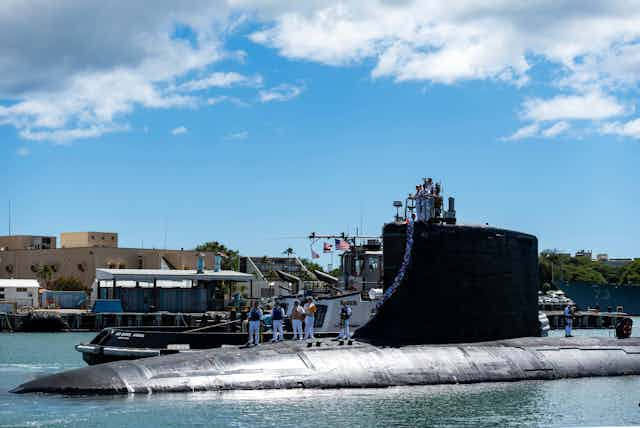As Anthony Albanese readies for the imminent unveiling of details of the nuclear-powered submarine acquisition program under AUKUS, one important question looms.
Can the prime minister juggle this closer Australian-American military embrace with a continuation of the improving Australian-Chinese relationship?
Albanese has been on the international stage for the best part of a year now, and he has been sure-footed.
The most notable development in that time has been China taking Australia out of the freezer, following the low of the Scott Morrison years.
The Australian government has been careful not to over-hype the progress, talking about “stabilising” the relationship, rather than using stronger language.
Nevertheless, the government is ambitious in terms of China. One hope is for an invitation for Albanese to visit Beijing as early as this year.
Will the hoopla in San Diego, where Albanese will be alongside US President Joe Biden and British Prime Minister Rishi Sunak, slow things down?
Chinese President Xi Jinping’s government is vocally critical of AUKUS, which the US, UK and Australia conceived, at its core, as part of a long-term policy of containment of China.
On the other hand, China sees the continuation of its recent, more outward-looking diplomacy, which in part has driven the improved relationship with Australia, to be in its national interest. And China will also note that the major delivery points in the submarine program (reportedly involving both US and British boats) are well into the future.
The Australian government will hope China lets this particular AUKUS moment pass with a few sharp words but without fallout for the bilateral progress.
If and when Albanese sets foot in Beijing in the relatively near term, it will probably be the greatest diplomatic challenge he’s faced up to that point.
Striking the right note when your host is the country you are overtly boosting your military capability against is an exacting test.
Read more: The long-awaited AUKUS submarine announcement is imminent. What should we expect?
On another front, when you think of Labor history, it’s been remarkable how easily Albanese has been able to don Morrison’s AUKUS clothes.
The early fitting for these garments came when Morrison, with Biden and then-British PM Boris Johnson, announced the historic security agreement, which gives Australia access to key technology, in September 2021.
It had been a tightly-held secret, so there was little time for Albanese to prepare. But given his small target strategy, he knew there had to be a near-instant response and that it must be positive.
Labor signed up. There was no sign of revolt from the left in caucus, no agonised party debate.
Compare, for example, when then-Prime Minister Bob Hawke had to retreat under caucus pressure after agreeing American planes could use Australian facilities as part of monitoring MX missile tests in the Pacific.
Labor has strongly supported the US alliance over the decades. But within, Labor there have often been arguments over particulars. In 1963, during the Cold War, the stance Labor should adopt on the planned North West Cape Naval Communication Station caused a massive internal upheaval.
At that time, Labor’s extra-parliamentary organisation was a powerful and fierce beast, and then-opposition leader Arthur Calwell and his deputy Gough Whitlam had to wait outside a Canberra hotel while the party’s federal conference debated the issue (it gave approval in a knife-edge vote).
The power of the extra-parliamentary party has long been quashed. In the parliamentary caucus, the left (in which Albanese was once an outspoken member) has become the tamest of creatures. The factions these days are primarily groups for dividing up spoils rather than hotbeds for policy argument.
Read more: As Australia's military ties with the US deepen, the Top End becomes even more vital to our security
These days, the Greens are the party of choice for many hard-line left wingers.
On AUKUS, we’re not seeing a crack of light between Albanese and Peter Dutton, with the opposition leader last week affirming, ahead of the announcement, support for all the decisions to be taken under the pact.
Although its strategic implications and reach are enormous and the government will stress the jobs and other economic benefits involved, the submarine announcement won’t seem to have great immediate relevance for many voters.
But when we think about the services we want from government, there’s another story.
In the October budget, defence funding for 2022-23 was 1.96% of GDP. Albanese has flagged that it will rise in the May budget. Over the coming years, given a threatening strategic outlook and the huge cost of the submarines and other purchases, it is expected to increase substantially.
Read more: Grattan on Friday: Adam Bandt is wedged by Greens' overreach on emissions legislation
While the imposts will be tilted to future years (and future governments), the trajectory will nevertheless be clear.
This comes as other pressures on the budget – from the National Disability Insurance Scheme, the health system, interest on debt – are great. And that’s besides the pressure to boost the amount those on unemployment benefits receive, and other welfare demands.
The implications for the May budget are just the start. By the time it faces the people again, by May 2025, Labor will need to have a lot more to say about how it is going to raise enough money to pay for the calls on the budget – calls from programs it wants to fund and from others, like the submarines, that it knows it must.
In 2025, the Albanese government won’t be able to be a small target.

